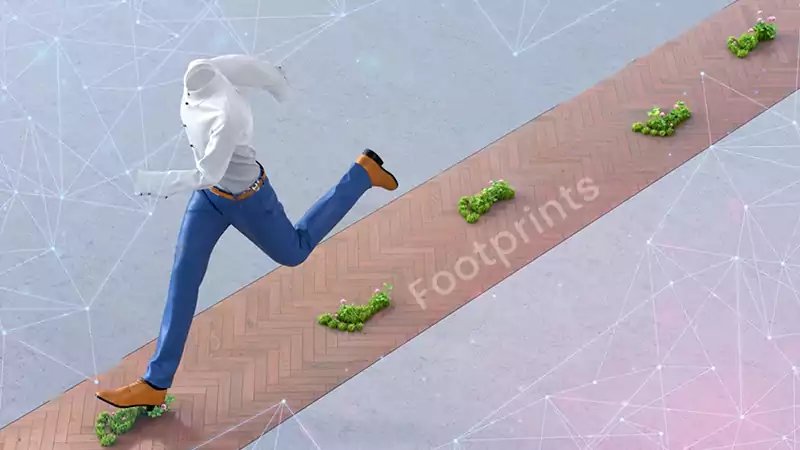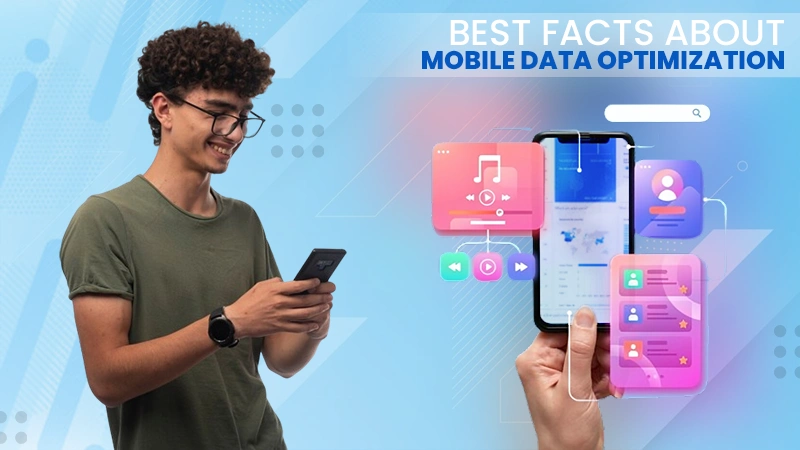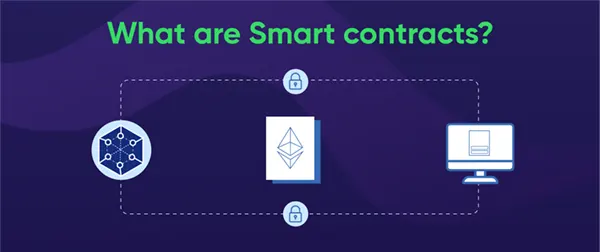
Contracts are vital to the operation of today’s society and many areas of our private and professional lives.
Smart Contracts are among the most decisive components of Blockchain technology since they help to safeguard as well as set up transactions.
Not only that but it helps it be simpler for various other parts as programs operating on these platforms are simply available.
If you want to know more about bitcoin trading to know whether you should invest, you can visit the official platform.
Meaning of Smart Contract
Smart contracts are applications or maybe protocols for automated transactions kept on a blockchain and performed according to specific conditions.
Long story short, they are simple programs stored on a blockchain that run when certain predetermined criteria are met.
Do You Know?“Smart Contracts On Blockchain Market” Research Report 2023 provides a comprehensive analysis of market segmentation based on Regions, Applications (Financial, Government, Insurance, Healthcare, Others), and Types (Deterministic Smart Contract, Non-Deterministic Smart Contracts).
Smart contracts, simply put, automate the delivery of contracts therefore all parties can determine the result as quickly as possible without the participation associated with a third party or maybe a period delay.
Smart contracts are self-executed contracts where the content of the buyer-seller agreement is exclusively inscribed in lines of code, which makes the transactions traceable, irreversible, and transparent.
Remember, smart contracts should not be confused with smart legal contracts.
What are the Benefits of Smart Contracts?
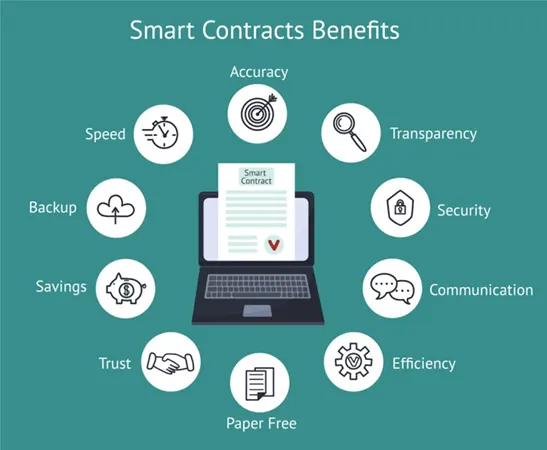
Security
The transactional activities on a blockchain happen to be encrypted and therefore simple to hack.
Also, since each history on a dispersed ledger is associated with the prior and subsequent documents, cybercriminals will need to alter the whole chain to alter one record.
Efficiency, Accuracy, and Speed
The contract is carried out instantly whenever a requirement is satisfied.
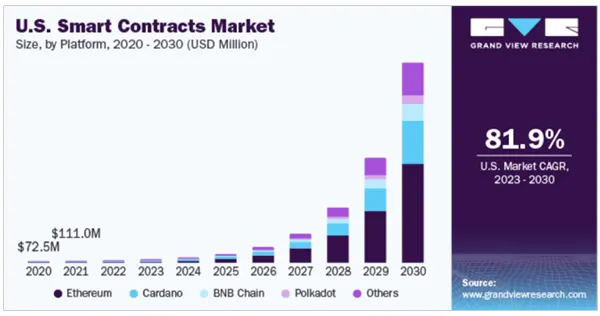
The mentioned graph indicates the global smart contracts market size was valued at USD 684.3 million in 2022. Further, it is expected to grow at a compound annual growth rate (CAGR) of 82.2% from 2023 to 2030.
Smart contracts are electronic and automated, which means there’s no paperwork to approach or maybe time spent reconciling mistakes that usually occur when signing documents by hand.
Savings
Smart contracts get rid of the necessity for intermediaries to speed up transactions and also by extension their related expenses as well as time delays.
Transparency and Trust
There’s no importance to be suspicious if data continues to be modified for personal gain as there’s no third party involved as well and encrypted files of transactions are discussed across participants.
Autonomy
During the procedure, smart contracts do not require any third parties or human intervention. As an outcome, it delivers autonomy and Independence to the parties.
This exceptional feature brings additional parks such as cost reduction and process speed.
Automatic Updates
The incorporation of technology and its anonymity lets the contracts automatically adjust and update. Therefore, it dispenses not only with the presence of intermediaries but also with new processes
These are the few benefits of smart contracts which may justify their use and popularization in recent years.
How does the Smart Contract Operate?
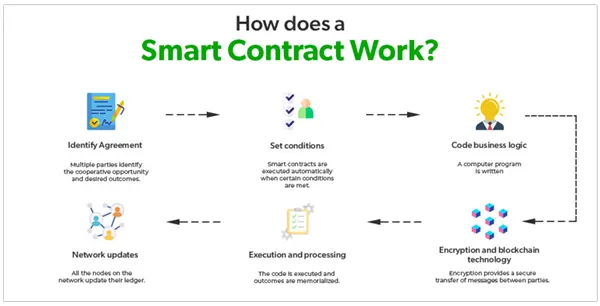
Smart contracts are a kind of software that encodes company reason and runs on a designated virtual machine integrated with a blockchain or any other distributed ledger.
Step 1: The business teams work together with the people to establish their requirements for the preferable behavior of the intelligent agreement when responding to particular events and situations.
Step 2: Some straightforward events consist of payment authorization, shipment receipt, or maybe a reading threshold for utility bills.
Step 3: Advanced tasks such as determining the worth of a supplemental fiscal instrument or instantly releasing an insurance payment may be encoded with more advanced logic.
Step 4: Developers then utilize a smart contract writing platform to develop as well as test the logic. The software is produced and then handed over to a distinct group for security tests.
Step 5: An organization that is focused on smart contract security or an internal specialist might be utilized.
Step 6: When authorized, the contract is going to be implemented on a current blockchain or any other distributed ledger system.
Step 7: The smart contract is set to look out for event changes from an “oracle,” which is essentially a cryptographically safe streaming information source after it’s been deployed.
Step 8: The smart contract is executed once it gets the necessary combination of incidents from one or maybe more oracles.
Applications of Smart Contracts
Here, in this section you can explore how businesses benefit from active blockchain solutions. These are a few areas where they can be applied:
- Increasing trust in retailer-supplier relationships.
The home decor uses them on blockchain to resolve disputes with vendors within no time. In support, of real-time time communication and increased visibility into the supply chain, retailers and suppliers can build a strong rapport.
Consequently, they will have much time to shift their focus on complex works, innovation, or where their presence actually required.
Interesting Fact: North America is estimated to have the largest market share over the forecast period and hold the largest market share of 26.2% in 2021.
- Making international trade faster and more efficient.
Contemporary, businesses are curating an ecosystem of trust and global trade. Being a blockchain-based platform, it utilizes standardized rules and simplified trading options which however reduces the friction and risk.
Nonetheless, it eases the trade process and widens the doors of trade opportunities for participating companies and banks.
Smart Contract’s Voting and Blockchain Implementation
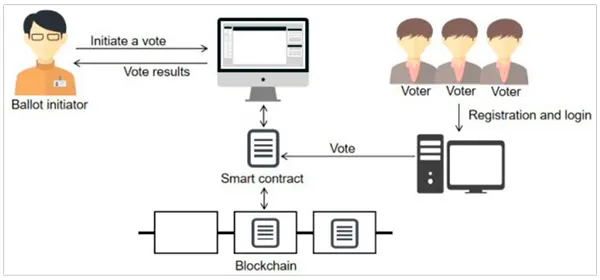
Typical difficulties could be fixed by utilizing Blockchain technology in the voting procedure.
The main voting is faced with issues with recording votes, including identity theft, duplicates, or partialness by electoral officials. Specific predefined terms, as well as conditions, are pre-determined within the agreement employing a smart contract.
An individual who votes can’t vote from a computerized identity apart from his or her own.
